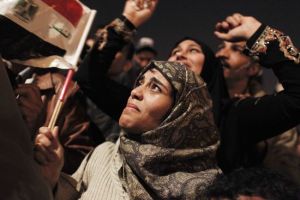Mubarak : 2011 :: Chávez : 2012 ?
 It’s become the opposition’s favorite parlor game: Could Chávez get Mubaraked next year? I think it could happen…but in an odd way. To see why, you have to understand how repressive regimes fail.
It’s become the opposition’s favorite parlor game: Could Chávez get Mubaraked next year? I think it could happen…but in an odd way. To see why, you have to understand how repressive regimes fail.
A major reason regimes like Mubarak’s, and Ben Ali’s, turn out to be brittle is that they stack up one incentive after another for people to falsify their preferences. You may despise the regime, but since expressing such a view is likely to get you imprisoned, tortured or worse, you have every reason to keep your views to yourself for as long as the overall Opposition seems weak.
Over time, your country is liable to end up in a situation where the vast majority of the population secretly hates the regime, but it’s too risky for any one person to say so. It’s a classic coordination problem: everyone wants to go second, no one wants to go first.
The events that create the conditions for overcoming this problem are, by nature, unpredictable. But, in time, some sui generis event comes along and sets off a defection cascade, where each defector’s decision lowers the cost of defecting for those closest to him/her, leading to yet more defections that in turn make it easier for yet more people to stop falsifying their preferences and express their anti-regime feelings openly.
In this sense, regimes are only as brittle as they are repressive. In particular, they’re brittle to the extent that their repression is comprehensive: that is, to the extent that they try to throw in jail everyone who speaks out against them. Comprehensive repression that sets the stage for mass preference-falsification, which itself is the pre-requisite for a defection cascade. Mubarak fell into that trap. So did Ben Ali.
Chávez hasn’t. In Venezuela repression has always been selective rather than comprehensive. The regime has made sure everyone knows that speaking out could get you in trouble…but most often won’t. The relative (please, oh hate-mailers, fixate on the qualifying adjective here) liberalism of the Chávez regime, when compared with the old-fashioned dictatorships of North Africa, make preference falsification far less prevalent in Venezuela. Ours, afterall, is the land of the Maisanta Database – a place where there’s not that much of a point falsifying your beliefs because the government already has an exhaustive list measuring each citizen’s political loyalties, and everybody already knows it has it.
My sense, though, is that there’s one segment of Venezuela’s population where preferences are increasingly falsified: the pro-Chávez camp.
As the regime’s one-time earnest followers get more and more disillusioned with its inability to deliver on bread-and-butter issues, they retain powerful incentives to fake ongoing loyalty, if for no other reason than to keep some sort of access to what remains of the Chavista welfare system. Within traditionally chavista circles, expressing doubt is tantamount to apostasy, creating something that looks curiously like a recipe for Brittle Authoritarianism…but only within the pro-Chávez camp!
(Think of this as a corollary to Petkoff’s bon mot about how the only ones who really don’t have any freedom of speech in our country are the government’s supporters.)
The intriguing possibility – the one the opposition needs to work towards over the next 22 months – is that the December 2012 presidential elections will turn into the “peculiar set of circumstances” that sets off a defection cascade within the ranks of disaffected chavistas, most likely in the aftermath of an amateurishly rigged election.
It’s in those circumstances that we could hope to bring the military – in Venezuela as in Egypt the ultimate arbiter of these things – over to our side, by showing them just how isolated the government they’ve been bolstering has become.
This, incidentally, is what makes a Cairo-on-the-Guaire scenario imaginable in 2012 whereas it wasn’t in 2002: back then, there was no chance of a defection cascade on the part of chavistas, because support for the government back then was not falsified!
For some time, people who run focus groups in Venezuela have been noting that the complaints and frustrations of chavistas in classes C, D and E are strikingly similar to those of their anti-government counterparts. That right there would seem like a first pre-condition for a defection cascade among them.
It’s too early to tell. But then, with these things, there are only two phases: too early to tell, and too late to stop.
Caracas Chronicles is 100% reader-supported.
We’ve been able to hang on for 22 years in one of the craziest media landscapes in the world. We’ve seen different media outlets in Venezuela (and abroad) closing shop, something we’re looking to avoid at all costs. Your collaboration goes a long way in helping us weather the storm.
Donate




